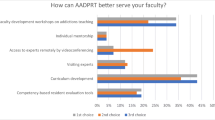Abstract
Objective
This article describes the evolution of subspecialty training and certification in addiction psychiatry. The impact of the newer subspecialty in addiction medicine is also addressed.
Methods
Information about programs and trainees was obtained from records of the Accreditation Council for Graduate Medical Education. Information about addiction psychiatry certification was obtained from the records of the American Board of Psychiatry and Neurology (ABPN). Information about the addiction medicine subspecialty was obtained from the American Board of Preventive Medicine.
Results
In AY 2020–2021, there were 53 addiction psychiatry programs with 92 fellows, and the numbers of each have increased over the past 5 academic years. The total number of addiction psychiatry certificates awarded through 2020 was 2806. Three years after addiction medicine programs were first accredited, there were 83 programs with 149 fellows. Thus far, 3282 addiction medicine certificates have been awarded, 1275 (38.8%) of them to ABPN diplomates.
Conclusions
In the 30 years since addiction psychiatry received subspecialty recognition, the numbers of training programs and fellows have grown steadily and are continuing to increase. Recently, the numbers of training programs and fellows in the newer subspecialty of addiction medicine have grown rapidly with substantial psychiatry involvement in addiction medicine training and certification programs. Nonetheless, it is apparent that the need for specialists with expertise in substance use disorders will far exceed the supply for the foreseeable future.
Similar content being viewed by others
References
Ronis R. Addiction psychiatry. In: Aminoff MJ, Faulkner LR, editors. The American Board of Psychiatry and Neurology: looking back and moving ahead. Washington, DC: American Psychiatric Publishing; 2012. p. 119–27.
Galanter M. The development of fellowship training in addiction psychiatry. Am J Addict. 2020;29(5):378–82.
American Board of Psychiatry and Neurology. Certification examination in addiction psychiatry 2020 content blueprint. Available at https://www.abpn.com/wp-content/uploads/2019/12/2020_Addiction_Psychiatry_CERT_Content_Specifications.pdf. Accessed 14 July 2020.
American Board of Psychiatry and Neurology. Maintenance of certification examination in addiction psychiatry 2020 content blueprint. Available at https://www.abpn.com/wp-content/uploads/2019/09/2020_Addiction_Psychiatry_MOC_Content_Specifications.pdf. Accessed 14 July 2020.
Faulkner LR, Juul D, Andrade NN, Brooks BA, Colenda CC, Guynn RW, et al. Recent trends in American Board of Psychiatry and Neurology psychiatric subspecialties. Acad Psychiatry. 2011;35(1):35–9.
Accreditation Council for Graduate Medical Education. Number of accredited programs and on-duty residents for the academic year (2010-2011). Available at https://apps.acgme.org/ads/Public/Reports/ReportRun. Accessed 24 March 2021.
Accreditation Council for Graduate Medical Education. Number of accredited programs, academic year 2020-2021, United States. Available at https://apps.acgme.org/ads/Public/Reports/Report/3. Accessed 12 October 2020.
Accreditation Council for Graduate Medical Education. Data Resource Book, Academic Year 2019-2020. Chicago, IL: Accreditation Council for Graduate Medical Education, 2020.
Accreditation Council for Graduate Medical Education. Addiction psychiatry programs, academic year 2020-2021, United States. Available at https://apps.acgme.org/ads/Public/Reports/ReportRun. Accessed 12 October 2020.
Accreditation Council for Graduate Medical Education. Addiction psychiatry programs, academic year 2019-2020, United States. Available at https://apps.acgme.org/ads/Public/Reports/ReportRun. Accessed 23 June 2020 (no longer available).
Accreditation Council for Graduate Medical Education. Program requirements for graduate medical education in addiction medicine. Available at https://www.acgme.org/Portals/0/PFAssets/ProgramRequirements/404_AddictionMedicine_2020.pdf?ver=2020-06-19-124857-297. Accessed 14 July 2020.
Nunes EV, Kunz K, Galanter M, O’Connor PG. Addiction psychiatry and addiction medicine: the evolution of addiction physician specialists. Am J Addict. 2020;29(5):390–400.
ABAM. Diplomate News. Issue. 2015;4:9 http://www.abam.net/wp-content/uploads/2015/03/2015-Spring-ABAM-Diplomate-News.pdf. Accessed 16 March 2021.
Derefinko KJ, Brown R, Danzo A, Foster S, Brennan T, Hand S, et al. Addiction medicine training fellowships in North America: a recent assessment of progress and needs. J Addict Med. 2020;14(4):e103–9.
Accreditation Council for Graduate Medical Education. Addiction medicine programs, academic year 2020-2021, United States. Available at https://apps.acgme.org/ads/Public/Reports/Report/1. Accessed 12 October 2020.
Accreditation Council for Graduate Medical Education. Addiction medicine programs, academic year 2019-2020, United States. Available at https://apps.acgme.org/ads/Public/Reports/Report/1. Accessed 23 June 2020 (no longer available).
American Board of Preventive Medicine. Addiction medicine content outline. Available at https://www.theabpm.org/become-certified/exam-content/addiction-medicine-content-outline/. Accessed 8 October 2020.
American Board of Preventive Medicine. Exam pass rates. Available at https://www.theabpm.org/become-certified/exam-pass-rates/. Accessed 22 March 2021.
American Board of Preventive Medicine, Copyright 2020. All rights reserved.
Lembke A, Humphreys K. The opioid epidemic as a watershed moment for physician training in addiction medicine. Acad Psychiatry. 2018;42:269–72.
Agapoff JR, Olson DJ. Challenges and perspective to the fall in psychiatry fellowship applications. Acad Psychiatry. 2019;43(4):425–8.
Balon R. Subspecialty training: time for change. Acad Psychiatry. 2017;41(4):558–60.
Kirwin P, Conroy M, Lyketsos C, Greenwald B, Forester B, DeVries C, et al. A call to restructure psychiatry general and subspecialty training. Acad Psychiatry. 2016;40(1):145–8.
Das S, Roberts LW. Addiction training: striving to fill an unmet need. Acad Psychiatry. 2016;40(3):451–3.
Francis R. Help wanted: medical educators in addiction psychiatry. Acad Psychiatry. 2018;42(2):273–6.
Rakocevic DB, DeJong SM, Saxon AJ, Renner JA Jr, Schwartz AC. A guide for applying to addiction psychiatry fellowship. Acad Psychiatry. 2020;44(2):135–40.
Association of American Medical Colleges. AAMC statement on House introduction of the Substance Use Disorder Workforce Act. Available at https://www.aamc.org/news-insights/press-releases/aamc-statement-house-introduction-substance-use-disorder-workforce-act. Accessed 22 June 2021.
Wood E, Samet JH, Volkow ND. Physician education in addiction medicine. JAMA. 2013;310(16):1673–4.
Author information
Authors and Affiliations
Corresponding author
Ethics declarations
Disclosures
On behalf of all authors, the corresponding author states that there is no conflict of interest.
Additional information
Publisher’s Note
Springer Nature remains neutral with regard to jurisdictional claims in published maps and institutional affiliations.
Rights and permissions
About this article
Cite this article
Juul, D., Haning, W.F., Ronis, R.J. et al. The Development and Current Status of Subspecialty Training and Certification in Addiction Psychiatry. Acad Psychiatry 46, 311–316 (2022). https://doi.org/10.1007/s40596-021-01514-y
Received:
Accepted:
Published:
Issue Date:
DOI: https://doi.org/10.1007/s40596-021-01514-y




